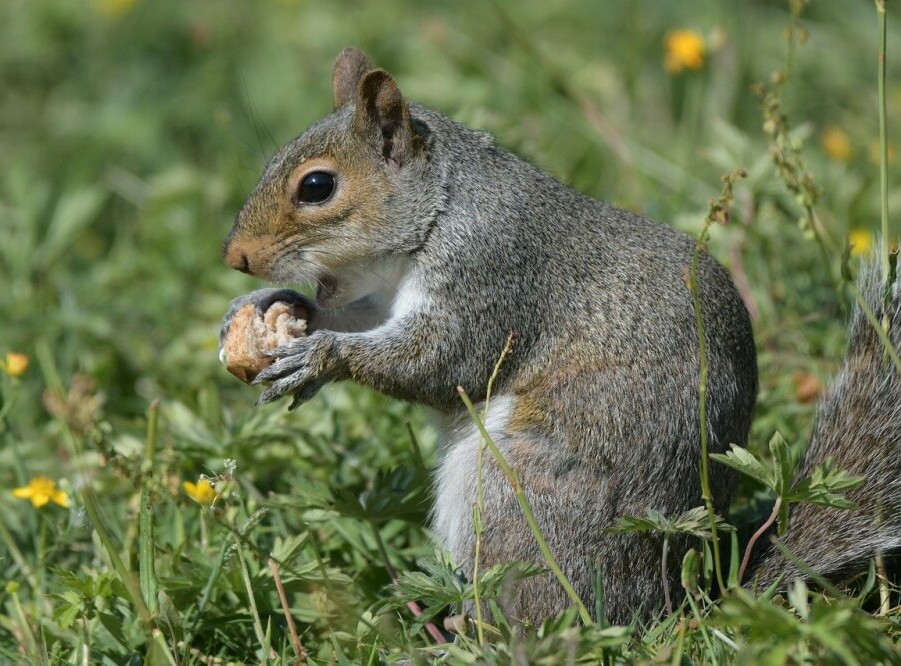Ways To Keep Squirrels Out Of Your Yard And Garden Plants
As an eco-expert, I’ve seen firsthand how a scurrying bunch of squirrels can turn your garden into a constant battle and headache. Your yard should be a refuge, not only for you but also for local wildlife like birds and bees you want in your yard and garden. So, let’s help you with keeping those furry little critters at bay while respecting the balance of nature. And don’t worry too much about the complexities; Let’s develop a straightforward, step-by-step plan from start to finish.
Here’s a little transparency: Our website contains affiliate links. This means we may receive a small commission if you click and make a purchase. Don’t worry, there’s no extra cost to you. It’s a simple way you can support our mission to bring you quality content.”
The need for a humane approach can’t be overstated. The idea isn’t just to protect your garden plants; it’s also about promoting coexistence with the local wildlife, including squirrels. As urban and suburban areas expand, we’re seeing more squirrels rummaging through our garden treasures. That’s why you’ll want to adopt strategies that are as economical as they are eco-friendly.
You can always adjust your approach down the road, but for now, let’s create a strategy that fits with your plans for your yard and garden. I’m especially excited to delve into economical methods because let’s be honest, we all appreciate solutions that are as kind to our wallets as they are to the Earth.
So today, I’m going to be talking about how to keep those squirrel visits to a minimum without compromising the integrity of your outdoor haven. And if you’re wondering about the connection between knowing your enemy and effectively defending your greenery, you’re about to find out about the secret strategies that can make all the difference.

Know Your Furry Foe: Squirrel Behavior & Habits
Okay, let’s get to grips with the creatures that we’re trying to outsmart- squirrels. If you want to keep these rodents out of your garden, it’s essential to understand their behaviors and what’s driving them to your yard or garden in the first place. Squirrels are creatures of opportunity, and unfortunately, your beautiful yard or garden is just full of these opportunities.
First things first, squirrels are primarily foragers. They’re always on the lookout for food, which means your garden’s produce and flowers often become their snack bar. These little guys have a penchant for nuts, seeds, fruits, and even some vegetables. By knowing this, you can think ahead about protecting the foods that are most likely to attract them.
Furthermore, these agile critters are natural acrobats. They can jump from branch to branch or scale your fences with ease. This means any open opportunity, like those branches hanging over your yard, could be a highway right into your yard or garden.
Another point to note is that squirrels don’t operate on a nine-to-five schedule. They’re active throughout the day, especially during the early hours and late afternoon. This is when you’ll want to be extra vigilant or have your deterrent strategies at their peak performance.
Lastly, these bushy-tailed visitors are persistent. If they find a good food source, they’ll keep coming back. So, the plan isn’t just to shoo them away once; we’re aiming for a long-term solution. However, the strategy we develop here will help with that. The next section will tackle various eco-friendly strategies to discourage our pesky and determined little friends from feasting on your foliage.
Crafting Your Battle Plan: Eco-Friendly Deterrent Strategies

If you want to keep those pesky squirrels at bay without harming them or the environment, it’s all about being wise, not tough. So, let’s get to work and create a strategy that’s eco-friendly and incredibly effective.
You’re going to find out about a range of deterrents, starting with what I like to call the ‘plant fortress’. Some plants are like kryptonite to squirrels. Try incorporating narcissus, hyacinth, or marigolds into your garden. These are not only beautiful but also emit scents that squirrels find unpleasant.
Physical barriers can be a game-changer alongside the use of repellent plants. This might include installing a wire mesh or netting that’s small enough to keep squirrels out but large enough not to harm them if they investigate.
Another often overlooked tool in your arsenal could be visual and auditory deterrents. Motion-activated sprinklers, wind chimes, or even aluminum foil strips that move in the wind can deter squirrels. These create an unpredictable environment that squirrels are more likely to avoid.
Finally, why not consider redirecting these little gymnasts? Setting up a designated feeding station complete with nuts and seeds might seem counterintuitive, but when placed strategically, it can draw squirrels away from your beloved plants.
Remember, the key here is consistency and variety. Squirrels are adaptable creatures, so don’t rely solely on one method. Rotate your strategies and keep them guessing. Alright, now let’s dive into how to put all this into play without breaking the bank in the next section.
Step-by-Step Guide: Implementing Your Eco-Strategies Economically

Implementing eco-friendly measures to keep squirrels out doesn’t have to break the bank. I’m going to walk you through how you can protect your garden from these critters in an economical way.
Step 1 is all about assessment. Begin by walking around your garden and identifying which areas are most vulnerable to squirrel activity. Look for easy access points like low branches or gaps in fencing where squirrels could enter.
Step 2 is to choose plants that squirrels aren’t particularly fond of and choose deterrents. Consider adding daffodils, alliums, or marigolds. These plants can act as a natural deterrent while beautifying your space. Sprinkling coffee grounds, sprinkling combinations of flour mixed with red or cayenne pepper, and spraying a solution of peppermint oil around your garden plants present deterrents that keep squirrels at bay. Regularly wet the coffee grounds with water to keep their effectiveness.
Step 3 involves constructive action. Set up fences or mesh around your most beloved plants. Chicken wire or hardware cloth can serve as budget-friendly options that are also quite effective. You don’t need to cover every inch of your garden, just the spots you’ve identified as squirrel favorites.
Step 4 involves you creating a diversion. Beyond your primary garden, provide an alternative food source for the squirrels, like a small feeder placed at a distance. This can draw their attention away from your prized tomatoes or tender greens.
Step 5 is all about vigilance. Regularly inspect your garden for signs of squirrel activity. Keep an eye on those barriers, and don’t be afraid to rearrange your setup if the squirrels become too clever.
Remember, this isn’t about a one-time fix; this is an ongoing dance with nature. You can always adjust your approach down the road as you learn more about your specific garden situation.
In the next section, we’re going to look at maintaining your defenses and adaptations. The goal is a thriving garden that both you and the local wildlife can enjoy – with clear boundaries.
Maintaining Your Green Refuge: Ongoing Management and Adaptation

So, you’ve set up your eco-friendly squirrel deterrents and your garden is beginning to thrive once again. But don’t kick back and relax just yet; maintaining a squirrel-free zone is an ongoing commitment. Regular check-ups on your garden’s defenses are key. Look for signs of nibbling or digging that could indicate a breach in your garden’s armor. Seize the opportunity to reinforce any weak spots or to try out new strategies if the squirrels are adapting.
Just as nature evolves, so should your methods. Squirrels are crafty creatures with a knack for finding their way into forbidden areas, so your tactics may need to adapt over time. Keep yourself informed about the latest eco-friendly deterrents and be willing to switch up your approach if necessary. This isn’t just about staying one step ahead of the squirrels—it’s also about staying aligned with ecological best practices.
Effective garden management also involves connecting with others in the eco-community. Share your successes and learn from the trials and errors of fellow gardeners. There’s a wealth of knowledge in community forums, local gardening clubs, or social media groups focused on sustainable living. Engaging with this community will not only provide moral support but also innovative ideas to enhance your garden’s defenses.

Don’t forget, your actions have a broader impact than just keeping your zucchinis intact. By choosing eco-friendly methods to manage squirrels, you’re contributing to sustainable gardening practices that benefit the wider ecosystem. Protecting your harvest can go hand in hand with protecting the planet—a responsibility and privilege all gardeners share.
I hope that you find these steps useful, and I’m eager to hear about your results. If you’ve crafted a particularly effective squirrel repellent or discovered a foolproof plant barrier, share it with the rest of us! It’s not only about the fruits of our labor but experimenting and learning we gather along the way. Remember, your first attempt doesn’t need to be your last—gardening is all about growth and adaptation, after all.





Hello Elridge, your guide on keeping squirrels out of yards and gardens is incredibly thorough and practical! You’ve provided a wealth of information on understanding squirrel behaviour and habits, along with eco-friendly deterrent strategies and step-by-step implementation guides. I appreciate your emphasis on humane approaches and maintaining harmony with nature while addressing the squirrel issue. Your suggestions, from planting repellent plants to setting up physical barriers and diversion tactics, offer a comprehensive approach to managing squirrel activity without harming them or the environment. Thank you for sharing your expertise and empowering readers to protect their gardens while respecting wildlife!
Thank you for this information packed post!
Though I adore squirrels I must admit they can be a bit of a nuisance especially when you have planned something for the garden. I like these strategies as they are both friendly to the animal as well as the environment and cost effective, a perfect solution!
I have been wanting to feed some birds and plant vegetation however the squirrels always get to it first and scare the poor feathered friends but hopefully now the squirrels will stay away!
Thanks again and have a great day!
Hi Elridge,
Your article tells a great deal. I can attest that keeping squirrels out of the yard can be rewarding and challenging, and this is from personal experience. Your article’s emphasis on comprehending squirrel behavior and using environmentally friendly deterrents aligns with my methodology. Using plants that squirrels do not find attractive—like marigolds, and erecting physical barriers has drastically decreased the number of times they visit my garden. Adding auditory and visual deterrents, like wind chimes, has also proven surprisingly successful. The most important lesson is that you can preserve your garden and coexist with nature simultaneously if you are persistent and patient. Not only have these tactics protected my plants, but they have also increased my respect for the local fauna.